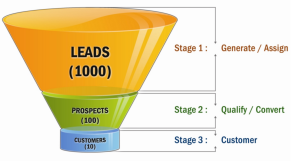
As you implement the perfect CRM and encourage your team to adopt it, you get closer and closer to an influx of opportunities and a shorter sales cycle.
Many variables can help you refine your sales workflow. But something as simple as CRM tasks can have a profound effect on the performance of your sales reps. When used correctly, these tasks can help your team stay engaged and on the right track.
Let’s explore how to use CRM tasks to keep your team firing on all cylinders.
What Are CRM Tasks?
Any project can be broken down into smaller tasks to be completed by individual team members. CRM tasks work the same way.
The object is to define a smaller piece of work that needs to be completed by a specific person on a specific due date. You can use fields such as “status,” “due date,” “assigned to” and “description” to identify and describe the parameters of the task. Tasks can (and should) be assigned to specific contacts, companies or deals for additional clarity.
The goal is to help your sales team stay up-to-date with contacting leads and following up, and to minimize administrative tasks.
Tasks help to keep your reps on track. When they have clearly defined tasks assigned to them, they know exactly what needs to be done and by when. With everyone on the team working toward a particular end goal, the sales process becomes more efficient and effective.
As with most things in business, it’s best to keep it simple at first, and then tweak as necessary.
Use Reminders to Keep Your Team On Track
Creating reminders in your CRM allows your team members to stay on top of their tasks without a lot of extra thought. This means less willpower exerted on making to-do lists and determining what needs to be completed here and now, and more energy and enthusiasm channeled into the sales process. After all, your reps would probably prefer to be making calls than handling other unrelated duties.
Success breeds success, and this also builds anticipation for the next sale. Staying enthused about sales can be difficult, especially when call after call ends in rejection. But that’s another aspect of using a CRM and a proper
With tasks and reminders in place, your team will feel more accomplished and on track.
Create a Predictable Workflow For Your Team
Change is difficult, and many people even resist it. Moving from a non-systemized approach (chaos) to a CRM alone will likely result in some pushback from your sales team, who’d rather be making contacts and talking to prospects. But given enough time, they’ll learn to love the new way of doing things, especially if it makes their job easier.
Showing up every day and having to adopt a new process isn’t fun for anyone. Plus, it doesn’t create consistency or predictability. Getting everyone to use an acceptable process is often better than no process, because it can always be tweaked and improved as new insights and discoveries emerge. And it reduces the guesswork that comes from unclear expectations.
Creating a predictable workflow also means reducing confusion as well as wasted time and energy. When you create tasks, remember to keep them simple and consistent. This will help your team stay productive and performing at optimal levels, and not worrying about what they might have to learn, or what might be different when they show up at the office tomorrow.
Help Your Team Focus On What Matters
Sales productivity cannot be achieved when your team isn’t focused on the right things. CRMs exist to mitigate unnecessary bloat and give you a systemized way of approaching sales. You can assign a value to qualified leads that are ready to buy and assess their sales-readiness based on criteria that you deem important. You can prioritize tasks that actually need to get done versus those that can wait for later or be eliminated entirely.
The less time, effort and cost spent on pursuing leads, the better, right? But this level of optimization cannot occur without prioritization and merciless triage. According to Shelley Cernel, Senior Marketing Manager at KnowledgeTree, 20 percent of your sales team are the top performers, leaving plenty of room for improvement among your other sales staff. Assigning tasks and helping them focus on what matters is a sure way to improve engagement and performance.
Use Your CRM As a Scoreboard For Your Sales Team
There’s nothing quite like the feeling of setting goals and achieving them in the predetermined time frame, or even before the deadlines you set.
Good CRMs allow you to run reports for your team and track how individuals or particular teams are performing. This means you can use it like a scoreboard to keep everyone motivated and excited about sales numbers. You can also foster a bit of a competitive spirit among your team members.
Few things are more confusing and frustrating than unclear targets and unspecified expectations for employees. They want to know what they’re shooting for and why it’s important to the company.
Using a CRM, you can get a high-level view of tasks, reminders, to-do lists, activity tracking and sales numbers. And what’s not great about that? Monitoring and completing tasks keeps your team “in the know” about objectives and how close they are to reaching them.
Final Thoughts
How are you using CRM tasks to keep your team engaged? Is your process predictable and consistent? Are you helping eliminate unnecessary admin duties and bloat so your team can focus on what matters? Are you motivating your team in the right ways?
Although simple, CRM tasks are sometimes overlooked as tools for sales enablement. They can be used to motivate your team and keep them on track, and that’s what every good CMO wants for their team.
Business & Finance Articles on Business 2 Community(48)







